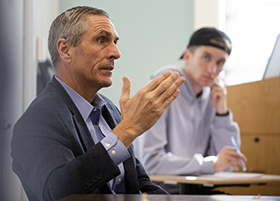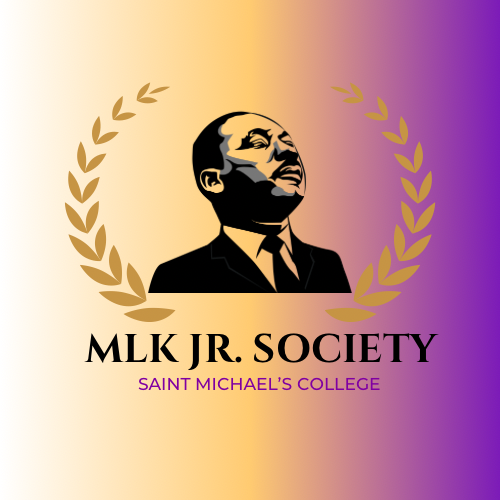
Jay Bellissimo ’87 visited the class of Political Science Professor Shefali Misra on Tuesday prior to his talk in the Roy Room of Dion Family Student Center later that day. (Photos by Jerry Swope).
Technology is one of the fastest growing industries in our society, and many students at Saint Michael’s College were able to get a taste for the future of artificial intelligence (AI) and how it will impact future careers. Jay Bellissimo, a managing partner of Cognitive Process Transformation at IBM and a 1987 Saint Michael’s graduate, gave a lecture in the Roy Room of the Dion Student Center this past Tuesday, October 29. Bellissimo discussed how artificial intelligence will shift the paradigm of the job market and create new opportunities that never existed before.
More data exists on this earth than human beings can handle, Bellissimo said. In fact, he said, only 20 percent of data available is present in search engines. The remaining 80 percent can only be accessed with the specialized technology that is inaccessible to ordinary citizens. Bellissimo argued that although the advancement of analytic data is a positive feat, accessibility is not readily available to the majority of the population. In addition, data is intellectual property and many issues surrounding its protection have arisen. Larger amounts of data have proven its usefulness for artificial intelligence; however, one would need permission from a variety of people or agencies to access the data needed for AI. This can become a cumbersome process as substantial amounts of data from different sources need to be learned for optimal functioning, he said..
“Artificial intelligence is not going anywhere” said Bellissimo. In fact, it requires the collaboration of many competing technological industries like IBM and Google to ensure that it continues to improve and flourish in our society. He said that within the next 3 years, as many as 120 million workers in the world’s 12 largest economies may need to be retrained to adapt to new types of jobs created or changed by artificial intelligence. As this industry continues to grow, there is a need for 1 million new STEM professionals in the next decade to fill the job pipeline. In addition to high demands, by the year 2030, 85 percent of jobs on the market would not have existed in 2019.
AI will continue to evolve and become a larger part of everyday society, and the use of neural networks have proven its helpfulness in the exploration of its data. Neural networks allow for the understanding of data and creation of contextual relationships — in other words, critical reasoning. “AIs start from scratch, teaching it a single task like speech encryption,” said Bellissimo, explaining that once AIs become trained, their computing capacities increase along with potential for future success.
Bellissimo ended his lecture by providing words of wisdom to students that can be applied to a wide variety of career paths. The five most prominent pieces of advice he gave to students are: “people want to work with good people; never stop learning; teamwork is important; ooze in integrity; and be equal.” Bellissimo said these are all important lessons he learned throughout his career, but to truly thrive in this field, you must have a never-ending desire to learn. “One of the most important things for any leader is to never let anyone else define who you are,” he said, encouraging students to assert their own boundaries, and most importantly, always exude confidence even in the face of adversity.
Bellissimo closed his lecture with this quotation from Thomas Watson J Jr.: “Computing will never rob a man of his initiative or replace the need for creative thinking. By freeing man from the more menial and repetitive forms of thinking, computers will actually increase the opportunities for the full use of human reason.”

For all press inquiries contact Elizabeth Murray, Associate Director of Communications at Saint Michael's College.





